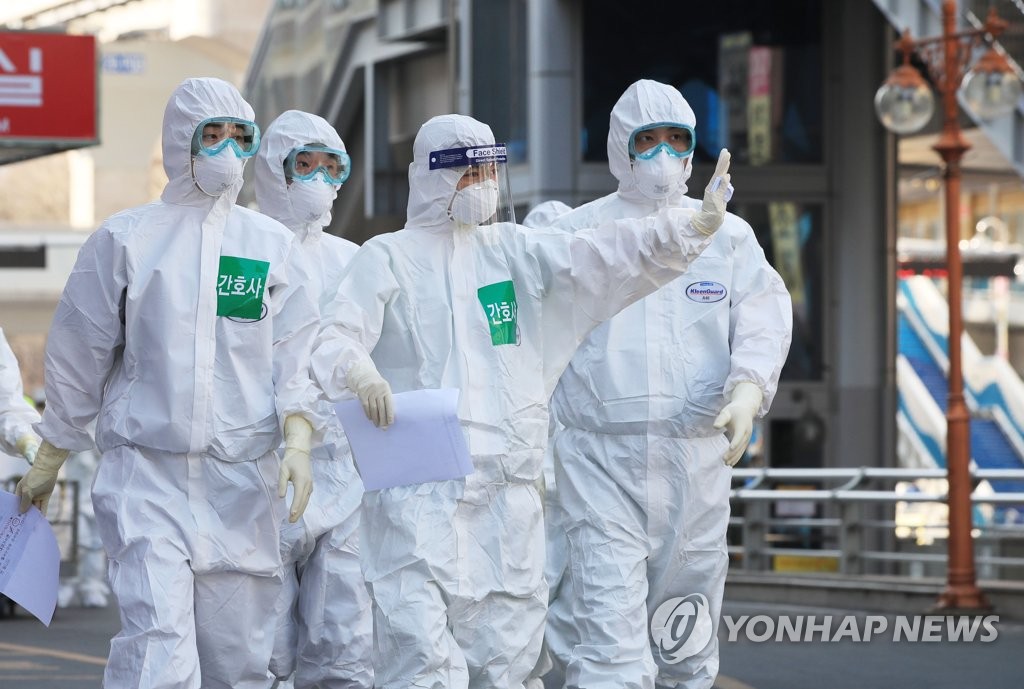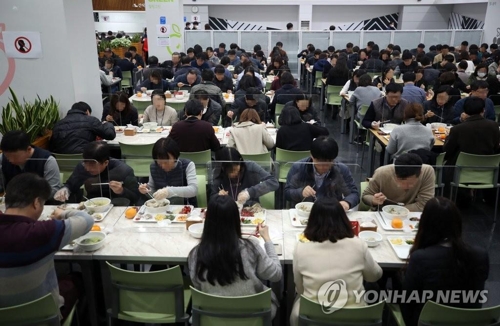- California Assembly OKs highest minimum wage in nation
- S. Korea unveils first graphic cigarette warnings
- US joins with South Korea, Japan in bid to deter North Korea
- LPGA golfer Chun In-gee finally back in action
- S. Korea won’t be top seed in final World Cup qualification round
- US men’s soccer misses 2nd straight Olympics
- US back on track in qualifying with 4-0 win over Guatemala
- High-intensity workout injuries spawn cottage industry
- CDC expands range of Zika mosquitoes into parts of Northeast
- Who knew? ‘The Walking Dead’ is helping families connect
S. Korea to require arrivals from U.S. to self-isolate for 2 weeks as imported cases jump
South Korea reported an uptick in new cases of the novel coronavirus on Wednesday, driven by a steady rise in infections in the Seoul metropolitan area and a jump in imported cases, prompting the authorities to require passengers coming from the U.S. for long-term stays to self-isolate for two weeks.
The 100 new cases, which were detected on Tuesday and up from 76 new cases a day earlier, marked the 14th consecutive day that there were 100 or fewer additional cases, according to the Korea Centers for Disease Control and Prevention (KCDC). Fifty-nine virus patients are in critical condition.
Tuesday’s number brought the nation’s total infections to 9,137 and the death toll rose by six to 126. Five more fatalities were reported later in the day, but they have not been included in an official update. The most recent deaths all involve people in their 70s and 80s.
The mortality rate stood at 1.38 percent as of Tuesday, according to the KCDC. For those aged 80 and above, the fatality rate was 13.55 percent.


Medical staffers wave to reporters while entering Dongsan Hospital in the virus-hit city of Daegu for a work shift on March 24, 2020. (Yonhap)
While new infections in Daegu and North Gyeongsang Province, the nation’s two worst-hit regions, showed signs of abating, despite some sporadic cases in nursing homes, there has been a steady rise in new cases in Seoul and neighboring areas, home to about 20 million people.
The total number of imported cases jumped by 34 to 101 on Tuesday, the biggest single-day rise so far. Of the 338 confirmed cases this week, 15-20 percent of daily infections reported have been people coming from abroad.
In addition to the 34 imported cases detected at airports on Tuesday, 17 more imported infections were confirmed by local governments. Of the 51 imported infections, 43 were of South Korean nationals and eight were foreigners.
South Korea has enforced a two-week quarantine period and virus tests for all long-term arrivals from Europe, regardless of symptoms, in an effort to contain imported virus cases.
Yoon Tae-ho, a senior health ministry official in charge of containment measure, told reporters that all passengers from the United States will also be required to self-isolate at home for two weeks starting Friday.
If a passenger coming from the U.S. shows symptoms, the passenger will be quarantined, Yoon said.
Foreigners and South Koreans without symptoms coming from the U.S. for long-term stays will be required to self-isolate at home for two weeks. If they show symptoms during self-isolation, they will get tested by local health authorities, Yoon said.
Seoul, Incheon and Gyeonggi Province, which surrounds Seoul and Incheon, saw their new daily infections rise by 35 to 776 on Tuesday.
Daegu and North Gyeongsang Province reported 14 and five new cases, respectively.
South Korea began implementing stricter rules on social distancing Sunday to slow the coronavirus pandemic that emerged in China late last year.
Citizens are strongly urged to stay at home, except for essential needs or jobs, with the government also restricting religious gatherings, indoor sports activities and attendance at night clubs and other entertainment venues.
So far, 3,730 patients have recovered, while 5,281 are receiving treatment. South Korea has tested 357,896 people since Jan. 20, when the virus was first detected on South Korean soil.
In a telephone conversation with President Moon Jae-in on Tuesday, U.S. President Donald Trump asked South Korea to provide medical equipment support in the battle against the coronavirus pandemic.
KCDC Director-General Jeong Eun-kyeong said Trump asked South Korea to provide chemicals used for diagnosis, known as reagents.
Currently, five kinds of reagents have won emergency approval and about 20,000 tests are conducted per day in South Korea, Jeong said, adding that South Korea would provide reagents to the U.S.








![일본 사도광산 [서경덕 교수 제공. 재판매 및 DB 금지]](http://www.koreatimesus.com/wp-content/uploads/2024/07/PYH2024072610800050400_P4-copy-120x134.jpg)


